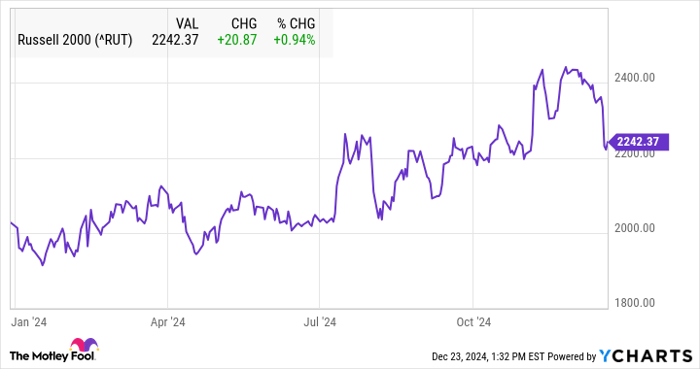The stock market declined a bit after the recent Federal Reserve interest rate decision, but the reality is that the main benchmark indices, including the S&P 500 and Nasdaq, are still within a couple of percentage points of their all-time highs. However, the recent market turbulence has disproportionately affected small-cap stocks, and as a result, you might be surprised to learn that the Russell 2000 small-cap index is down by nearly 9% from its recent high, very close to the 10% threshold that is generally considered to be a correction.
On the other hand, there is reason to believe that small-cap stocks could outperform in 2025. I've been buying shares of the Vanguard Russell 2000 ETF (NASDAQ: VTWO) in my portfolio, and here's why I think this could be one of the best investments for 2025 and beyond.
Where to invest $1,000 right now? Our analyst team just revealed what they believe are the 10 best stocks to buy right now. See the 10 stocks »
A massive valuation gap that keeps getting wider
At the beginning of 2024, the Russell 2000 was trading at its widest price-to-book valuation gap relative to the S&P 500 in 25 years. Fundstrat analyst Tom Lee named the Russell 2000 as his top idea of 2024 for this very reason, saying that expected falling interest rates could serve as a major catalyst to help narrow the gap.
However, throughout 2024 the gap only widened. Not only did megacap tech stocks continue their stellar performance, fueled by the AI boom, but interest rate expectations have moderated because of strong economic data.
Through Dec. 23, the S&P 500 has produced a total return of 26% for the year, while the Russell 2000 has managed just 12%. That's another 14 percentage points of outperformance. As of the latest data, the average S&P 500 component has a price-to-earnings multiple of 28.4 and trades for 5.0 times its book value. Meanwhile, the average Russell 2000 stock trades for a P/E of less than 19 and is valued at 2.1 times book. That's a big valuation gap.
Falling rates could be a big catalyst
I'm not saying that the valuation gap will naturally narrow over time with no help. And to be fair, there should be some gap between the two, as the S&P 500 is heavily weighted in favor of technology stocks, which tend to command higher price-to-book multiples.
However, if interest rates fall in 2025, especially if the Fed is more aggressive than the market expects, it could favor small caps, and for a couple of reasons.
For one thing, small-cap companies tend to be more reliant on borrowing money, so falling rates will make cost of capital lower. Plus, as rates fall, risk-free investments such as Treasury securities and CDs become less appealing, so more money could flow into the stock market and into smaller "riskier" investments.
It's also worth mentioning how the incoming administration is likely to create an environment that is more business friendly. We could see lower corporate taxes, looser regulations, and more, and that would probably disproportionately help smaller businesses compete with their large-cap counterparts.
A great ETF to buy right now
To be perfectly clear, I'm not suggesting that anyone buy the Russell 2000 specifically for what it could do in 2025. This is a solid, well-rounded index that should deliver strong total returns over long periods, regardless of what happens in any particular year. But last time the valuation gap between small-cap and large-cap stocks was so wide, small caps proceeded to outperform for more than a decade, so now could be a strong buying opportunity for patient long-term investors.
Don’t miss this second chance at a potentially lucrative opportunity
Ever feel like you missed the boat in buying the most successful stocks? Then you’ll want to hear this.
On rare occasions, our expert team of analysts issues a “Double Down” stock recommendation for companies that they think are about to pop. If you’re worried you’ve already missed your chance to invest, now is the best time to buy before it’s too late. And the numbers speak for themselves:
- Nvidia: if you invested $1,000 when we doubled down in 2009, you’d have $362,841!*
- Apple: if you invested $1,000 when we doubled down in 2008, you’d have $49,054!*
- Netflix: if you invested $1,000 when we doubled down in 2004, you’d have $498,381!*
Right now, we’re issuing “Double Down” alerts for three incredible companies, and there may not be another chance like this anytime soon.
*Stock Advisor returns as of December 23, 2024
Matt Frankel has positions in Vanguard Russell 2000 ETF. The Motley Fool has no position in any of the stocks mentioned. The Motley Fool has a disclosure policy.
The views and opinions expressed herein are the views and opinions of the author and do not necessarily reflect those of Nasdaq, Inc.



